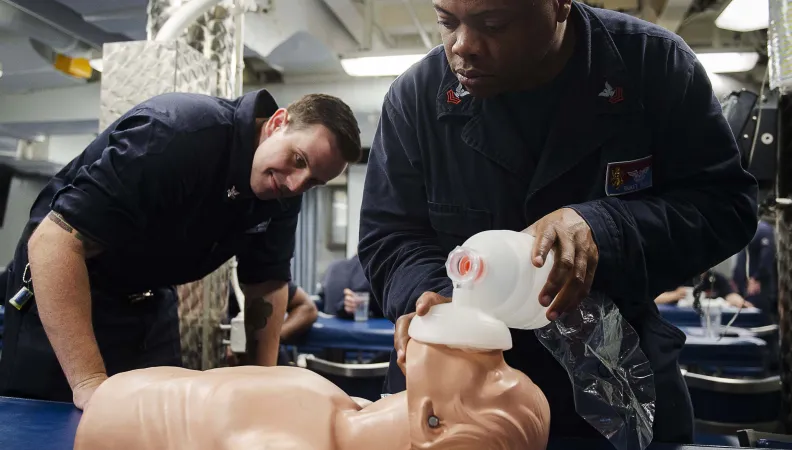Share the page
Joining in the fight against Covid-19 and diversifying activities: The case of SERMP in Morocco
Published on

Private Sector & Development #34 - Embracing the challenges of sustainable industrial development
Essential to economic development, the industrial sector is also a source of controversy (environmental impact, creation of decent jobs, etc.). The 34th issue of Private Sector & Development is dedicated to the questions raised by this sector as we are embracing sustainable development.
SERMP is a Moroccan aeronautical subcontracting company. Like the entire sector, it is feeling the economic repercussions of the Covid-19 crisis. To both contribute to the national effort and diversify its activities, SERMP has successfully launched the production of ventilators as part of a consortium of companies with complementary expertise. The company is now considering developing its activities in the medical sector.
Société d’Étude et de Réalisations Mécaniques de Précision (SERMP) manufactures aeronautical parts and mechanical assemblies for aircraft, engine and equipment manufacturers. SERMP has experienced strong growth since it was set up 20 years ago and has more than doubled its industrial facilities, showing the same dynamism as its parent company, Le Piston Français, which operates on six sites in France and Poland and employs some 700 people. With a turnover multiplied by 1.6 since 2012, the Group has benefited from the good health of the aviation industry. Indeed, with an annual increase in traffic of about 6%,1 there was strong demand from aircraft manufacturers, the Group’s main ordering parties. Significant investments were made in both increasing the production capacity and innovation (with an environmental focus to reduce the carbon impact of engines, for example). But the Covid-19 crisis has disrupted these dynamics.
PRODUCE LOCALLY TO MEET URGENT NEEDS
The best-case scenarios for the industry now forecast that it will take three years to recover to 2019 traffic levels. Furthermore, demand for aircraft is expected to drop by about 50% over the next five years2 leading to a major reorganization of the aviation industry. The entire value chain, including many SMEs and mid-cap companies, is affected. In these circumstances, SERMP wanted to take up a twofold challenge: respond to the urgency of the situation by contributing to the national effort to tackle the pandemic and reconfigure its strategy to cope with the crisis. According to the World Bank, the response of the Moroccan authorities was “swift and decisive3. While the country is set to experience its first recession since 1995 (negative growth of 4% is forecast), a number of measures have been put in place to support activities weakened by the crisis and vulnerable people, and mobilize Moroccan industry to contribute to the fight against Covid-19. Many projects have been set up to locally produce protective products: hand sanitizers, face shields, masks… The objective was to meet local demand without exacerbating the increasing tensions on global supply chains. It is in this context that SERMP, Aviarail (engineering company) and other aviation indus-try partners, under the leadership of the Ministry of Industry and coordinated by Gimas4, decided to produce a ventilator “Made in Morocco”. An idea that became a collaborative industrial project bringing together some fifteen companies, as well as researchers, academics and doctors. It was necessary to develop and produce ventilators in a short space of time – the first version was designed in a week, and it took six more weeks to produce the fourth version, while manufacturing all the parts and purchasing local components, in view of the border closures and global tensions on the supply of these products.
POOLING EXPERTISE: THE KEY TO SUCCESS
To achieve this ambitious objective, it was necessary to put together a multidisciplinary team able to quickly and effectively learn how to manufacture medical equipment. The roles of the various stakeholders were carefully defined. SERMP handled the project management, from the design of the mechanism to the final assembly of the ventilator, as well as the controls and tests. It was also involved in the production of parts (in-house and through two other machining specialists, UMPM and Halmes). Aviarail handled the electronic engineering (design of the circuit board) and software development, in partnership with Tronico. Crouzet worked on the pneumatic diagram and developed the ventilator motor, Valtronic manufactured the circuit boards, OB Electronics worked on the wiring and Efoa handled the production of the casing, packaging and antibacterial treatment for the machine components. Finally, the technical centers Cetim, Cerimme and Cetiev took responsibility for approving these ventilators in order to obtain certifications and qualifications for “CE Medical” standards.
REINVENTING THE STRATEGY
From a project to respond to an emergency to an opportunity for diversification, the medical and biomedical sector could become a permanent business line for SERMP. This is especially because order books in the aerospace industry have been heavily impacted by the crisis and diversification has become an obligation to ensure the survival of many companies. Morocco’s experience has also been an inspiration and other subsidiaries of Le Piston Français Group are considering this type of diversification. Furthermore, to permanently establish this production of 100% Moroccan ventilators and consider the longer-term future, SERMP has helped to create an MMI (Moroccan Medical Biomedical Industry) cluster. The aim is to launch collaborative and innovative industrial projects in the medical sector and develop this industry in Morocco.
1 https://theconversation.com/trafi (consulté le 05/09/20) 1 https://theconversation.com/trafi (consulted on 05/09/20)
2 https://www.latribune.fr/entreprises-fi croissance-d-avant-crise-844872.html (consulted on 05/09/20).
3 http://documents1.worldbank.org/curated/en/278731594708906277/pdf/Morocco-Economic-Monitor.pdf (consulted on 05/09/20
4 Groupement des Industries Marocaines Aéronautiques et Spatiales, an inter-branch organization gathering 97% of Morocco’s aeronautics supply chain.
Author(s)
Badre Jaafar
Manager
SERMP

